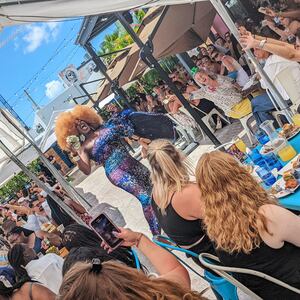When Florida Gov. Ron DeSantis made it known he wants to revoke the liquor license of a Miami restaurant that welcomes children to a weekend “drag brunch,” the state Department of Business and Professional Regulation (DBPR) went back 75 years and dusted off a Florida Supreme Court case involving what was variously called the Ha Ha Club and the Club Ha Ha.
The Ha Ha of Hallandale featured female impersonators and its very name signaled that, unlike strip clubs it was not about seedy sex, but campy fun. It had less to do with a leer than a laugh and it drew enough prominent people that the county commissioners overruled the city officials who initially refused to issue it a liquor license.
But one person who was not won over was a juvenile probation officer named Frank Tuppen. He went to Broward County Circuit Court in 1946 saying the Ha Ha was subject to Section 64.11, of the Florida Statutes, which provides for “the abatement of nuisances.” He argued that the Ha Ha constituted a nuisance by putting on “lewd, indecent and nasty” shows and should therefore be shut down.
ADVERTISEMENT
“The reputation of the club is so vile that mention of its name to juveniles in Broward County is synonymous with sexual perversion and as a result much juvenile delinquency has occurred,” Tuppen told the court.
The Ha Ha’s owner, Charles “Babe” Baker of the Federal Amusement Company argued that he was running a “high class” establishment with a clientele to match. Circuit Court Judge George Tedder was unpersuaded and issued a permanent injunction, commanding the Ha Ha to cease producing its shows.
Baker appealed to the state supreme court, which upheld the injunction in its 1947 decision State v. Federal Amusement Co.
“The lawful evidence presents a dirty picture, the Ha Ha club looks as if it were a cross between a ‘honky tonk’ and a ‘speakeasy,’” the supreme court found. “The fact that it is alleged to have been frequented by governors, senators, county officers and others of responsible status does not help if it is in fact listed in the category of things proscribed by the law.”
The final decree restrained appellants from “operating and maintaining any public nuisance at the Ha Ha Club” that might “tend to injure the manners and morals of the people.” But the supreme court stated that performances by female impersonators were not inherently obscene, and Baker secured permission to reopen with a show in keeping with the prevailing nightclub mores.
“Broward citizens were anxious to know what manner of show he would substitute for the chorus line of female impersonators which provided entertainment last season,” The Fort Lauderdale News reported on December 31, 1947. “They found their answer in short order. Men dressed in women’s gowns, wearing long wigs, high heels and heavily coated with makeup, are the featured performers in a 70-minute show which is first presented starting at about 11 p. m. Local nightclubbers noted that some of the lewdness of last season’s show is lacking, but that basically the entertainment follows the familiar.”
The probation officer went back to court. The judge ruled that the show still constituted a public nuisance, though he allowed that Baker “actually believed he was running a clean show.”
The establishment was shut down again, this time for good. Baker made the club a concept that moved from venue to venue. The show featured Jackie May, a celebrated female impersonator who had been reported by syndicated columnist Walter Winchell to have traded “ruffles for khaki” when he was drafted after Pearl Harbor. May was now back in ruffles and Winchell was among those who understood it was all about fun.
“Jackie May heads the big time 'Girl' show at Babe Baker’s Ha-Ha Club,” Winchell wrote in 1950. “A miniature Broadway musical, attractively frocked, and without a dull moment.”
But State v. Federal Amusement Co. slipped into obscurity. A check of news archives shows no instances where it was used to shut down other clubs prior to last month, when DeSantis saw a TikTok video of a little girl at the R House restaurant’s weekend drag brunch. He made it known he wanted the establishment’s liquor license revoked. The DBPR filed a complaint alleging R House is a public nuisance as described in State v. Federal Amusement Co.

A drag queen performs during drag brunch at R House in Wynwood, Florida.
Francisco AlvaradoExhibit 4 in the complaint is the menu for the drag brunch that R House offers on weekends from 11:30 a.m. to 2:30 p.m.
“The Brunch menu advertises a ‘Kids Brunch’ for children ‘up to 12 years of age’ and allows the ‘choice of any two [food items] from above selection, soft drinks and of course our fabulous show,” the complaint notes. “In other words, Respondent is not merely aware that young children attend the brunch, but specifically markets the Brunch performances to young children.”
But the little girl in the video that so outraged DeSantis looks to be around five and did not likely come without an approving parent. And in deciding a bawdy drag sense of fun is appropriate for a child, the adult who brought her was exercising parental rights such as DeSantis has often cited when it comes to masks and school curricula.
Exhibit 4 also attests that some parents are of a different view than DeSantis. The complaint itself proves that he is not really concerned about the rights of the actual parents of the particular children in question. He stands up for a parent’s right to choose as long as the parent concurs with him.
When asked for comment regarding the complaint, the R House said that the matter is in the hands of its “legal team,” which is seeking to “rectify the situation.”
“We are an inclusive establishment and welcome all people to visit our restaurant,” an R House statement said. “We are hopeful that Governor DeSantis, a vociferous supporter and champion of Florida’s hospitality industry and small businesses, will see this as what it is, a misunderstanding.”
A DeSantis spokesperson referred The Daily Beast to a July 29 tweet and video clip.
“Florida stands with parents to protect children,” De Santis tweeted. “Exposing children to inappropriate sexualized content is wrong and the state will hold accountable those establishments that transgress this clear boundary.”
Whether or not he does run for president, DeSantis is clearly already seeking to become the presiding parent.







